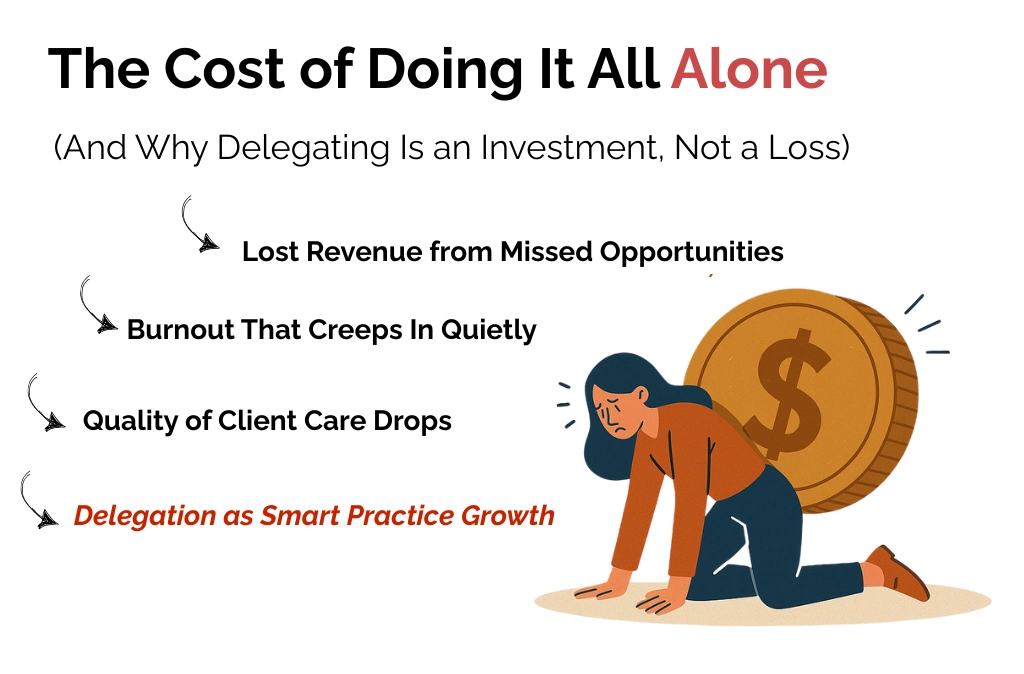
Why Virtual Assistant for Therapists Is Even a Thing?
Ever feel like you’re doing two full-time jobs as a therapist AND a business manager?
Managing your practice while juggling admin duties can feel overwhelming and, frankly, unfair. Therapists invest their energy in helping clients resolve life’s toughest emotions, yet they’re also expected to handle scheduling, billing, marketing, and compliance. Finding the right virtual assistant for therapists can help skip most of these taxing tasks to focus on care.
For practitioners, this can be a great way to balance daily responsibilities while making client care the priority. Such situations can help you find the right person for assigning administrative tasks and to get free hours for more business growth.
So, how can you streamline your operations and delegate backend tasks? What is the secret to reclaiming your time, protecting your energy, and serving your clients better? Read further to understand what the best virtual assistant for therapists can do for your business.
What Exactly Is a Virtual Assistant for Therapists?
It is a virtual assistant with a knack for your industry and its workings. Individuals who join your solo team as virtual assistant for therapy practice are equipped with the knowledge of specific tasks that might not commonly be delegated. These virtual assistants act as a support pillar and help you manage your backend, from accounting to scheduling so you never miss an appointment or a tax filing.
Most individual therapist business owners are oblivious to the fact that much of their time is eaten up by minor tasks. But, study has shown that at least an extra 40 to 50 hours is the common average of time for completing your entire admin tasks in a week. So, numbers show that virtual assistant for therapists isn’t just a concept that became popular but an actual market gap that is now being fulfilled by apt virtual assistants from all around the world.
Signs You Might Need a VA (Even If You Think You’ve Got It Handled)
As a therapist, you’re trained to spot subtle signs when someone needs help even if they say they’re fine. Now flip the lens, your solo therapy practice might be sending out signals too.
Do you often find yourself completing notes late at night, rescheduling clients due to overwhelming administrative demands, or putting off essential tasks like billing, marketing, and email communication? These aren’t minor issues, they’re clear indicators of professional burnout and functional overload.
Still not sure? Ask yourself the following:
- Are you spending more time on paperwork than with clients?
- Is your calendar starting to feel like chaos?
- Do you feel a sense of guilt every time you “skip” a task?
These seemingly minor moments represent emotional and working drain points that a skilled virtual assistant for therapist can effectively manage, preventing burnout before it takes hold. Delegating tasks isn’t about relinquishing control; it’s about creating the capacity to fully engage in your clinical work with clarity and presence.
How Virtual Assistants Help Therapists Reclaim Their Time and Energy
Therapists are solopreneurs. This means they can’t afford to hire virtual assistants for therapy practice. Rather, they prefer to work with one or two reliable virtual assistants that can help them handle multiple tasks easily. There are many tasks that can be outsourced to relieve some of the pressure and to improve the overall return on investment of VAs.
People often feel emotionally fatigued when bombarded with many tasks. Therapists are prone to this compared to most others because of their daily demands of job interacting with multiple individuals. A VA for therapist is like an experienced coordinator who helps you manage all tasks timely, so later, there is no emotional overload due to pressure and burden.
Here are some tasks that a virtual assistant for therapist can handle according to their practice:
Solo Therapist Practice Support

In a solo practice, therapists juggle everything from intake to invoicing and that’s where a virtual assistant becomes essential. With the right support, therapists can focus on client work while the VA takes care of day-to-day admin and backend operations.
Key tasks a VA handles in solo practices include:
- Managing client intake (responding to inquiries, sending forms, scheduling sessions)
- Appointment reminders and follow-ups for missed or rescheduled sessions
- Uploading and organizing session notes, consent forms, and assessments securely
- Sending invoices, processing payments, and generating superbills
- Maintaining directories (Psychology Today, TherapyRoute, etc.) and practice websites
- Writing newsletters, blog posts, and social content to grow the therapist’s online presence
- Creating automation or checklists for onboarding and client feedback
A solo therapist’s VA also often becomes a sounding board for workflow efficiency—helping set up systems like HIPAA-compliant CRMs or productivity dashboards to streamline the entire practice.
Group Therapy Practice Support

In a group setting, the role of a VA becomes more dynamic. They serve as the communication bridge between multiple therapists, clients, and sometimes even external providers or referral networks. This kind of multi-layered support requires strong organization and flexibility.
Tasks may include:
- Coordinating session schedules for multiple clinicians
- Matching clients with the right therapist based on specialty or availability
- Standardizing intake and documentation across the group
- Managing multi-provider billing, including therapist payouts or 1099 tracking
- Assisting with hiring: posting jobs, reviewing applicants, onboarding new team members
- Keeping therapist bios updated and ensuring license renewals or CEU tracking
- Organizing internal meetings, updating shared SOPs, and handling secure file storage
Group practices also often require centralized marketing support. A VA can manage email campaigns, content calendars, reviews, and digital ads that reflect the collective brand identity.
Specialty Therapy Practice Support
Therapists working in niche areas like trauma healing, or EMDR benefit from VAs who understand nuanced workflows and the sensitivities around advanced care.
Specialty support may include:
- Scheduling extended sessions (90–180 minutes) and managing integration timelines
- Preparing clients with intention-setting resources or medical clearance steps
- Coordinating with prescribing clinicians (in the case of KAP or psychiatric partnerships)
- Sending and tracking unique consent forms for unusual interventions
- Assisting with event logistics (retreats, webinars, intensives, educational series)
- Managing program-based client journeys with multiple phases and checkpoints
A specialty-focused VA can also help maintain a therapeutic environment digitally, whether that’s setting up music playlists for virtual sessions, curating integration follow-ups, or supporting research documentation for psychedelic work.
Virtual assistants for therapists use helpful tools to make work easier. They handle calendars with Google Calendar, manage records with SimplePractice or TheraNest, and talk through Gmail or Slack. For payments, they use Stripe or PayPal. They also use Canva, Mailchimp, and Google Forms for marketing and forms.
What to Look for in a VA Who Understands Therapy Work

According to a 2023 survey by the American Counseling Association, 61% of therapists reported administrative overload as a top contributor to burnout. So, delegating to the right virtual assistant for therapist can help reduce that strain without compromising care.
So even if you might have the option to choose a general VA, we recommend you go for virtual assistants for therapists. Here are some ways in which VA therapists differ from the generic ones:
| Criteria | General VA | Virtual Assistant for Therapists |
|---|---|---|
| Tone & Communication | Professional but templated | Uses warm, empathetic language—understands tone can affect client retention (noted by 48% of therapists). |
| Client Interaction | Task-oriented, efficient | Aware of emotional nuance—trained to avoid triggering language or boundary violations. |
| HIPAA Awareness | May not be familiar with regulations | Compliant with HIPAA, understands the legal risks—essential as 70% of practices handle sensitive data. |
| Scheduling & Admin | Uses standard calendar apps | Proficient in therapy tools like SimplePractice, TheraNest, and TherapyNotes (used by 3 in 5 private clinics). |
| Documentation Support | Can help with forms | Knows how to manage progress notes, intake forms, consent documentation, and secure storage practices. |
| Marketing Support | Creates general posts and emails | Understands ethical constraints, avoids testimonials, and promotes trauma-informed strategies. |
| Billing & Insurance | Sets up Stripe or PayPal | Familiar with therapy billing codes, superbills, and mental health CPT time frames. |
| Understanding of Practice Flow | Operates with a basic admin model | Supports the ebb and flow of emotional labor, cancellations, and post-session follow-up. |
The Cost of Doing It All Alone (And Why Delegating Is an Investment, Not a Loss)

For many therapists, especially in solo or small practices, doing it all feels like the default. But the hidden costs of managing every task yourself can quietly erode both your well-being and your business.
Lost Revenue from Missed Opportunities
Every hour spent troubleshooting a billing issue, rescheduling appointments, or chasing paperwork is an hour not spent in session which is considered your most valuable service. If your hourly rate is $150, just four hours a week on admin equals over $30,000 annually in lost client time.
Burnout That Creeps In Quietly
Juggling clinical and administrative work leads to emotional fatigue. Notes at midnight, delayed responses, and an ever-growing to-do list chip away at your energy and your capacity to be present for clients. Burnout doesn’t happen overnight, but it builds fast when there’s no buffer.
Quality of Client Care Drops
Therapeutic presence requires mental clarity and emotional bandwidth. When you’re preoccupied with tasks outside your clinical role, it becomes harder to track subtle cues, hold space, and offer deep, attuned care. Delegating allows you to conserve your best energy for what matters most, your clients.
Delegation as Smart Practice Growth
Hiring a therapy-savvy virtual assistant isn’t an expense; it’s a strategic investment in your time, capacity, and peace of mind. VA support means sessions run smoother, systems stay compliant, and you stay focused on outcomes and not operations.
Bringing a VA Into Your Practice the Right Way
Hiring a virtual assistant is a major shift not just in operations, but in how your time and mental space are used. To get the most from your VA, your first 30 days should be focused, intentional, and collaborative. Here’s how to do it right:
Week 1: Foundation & Understanding
This week is crucial for laying the groundwork and building good communication.
- Share a welcome email that sets the tone, expectations, and workflow preferences.
- Introduce your tech stack (e.g., EHR system, calendar tools, email platform).
- Give a clear, manageable starter task list — think calendar management, inbox clean-up, intake form review.
- Schedule a brief check-in call to answer questions and establish communication rhythms.
Resource: Use a simple “Welcome Email Template” to align tone and structure from Day 1.
Week 2: Soft Onboarding Begins
Start week 2 by delegating low-risk tasks while observing their process.
- Assign recurring tasks like appointment confirmations, rescheduling requests, or organizing digital files.
- Share SOPs (Standard Operating Procedures), even if rough — a basic SOP Starter Kit with screenshots, voice notes, or Loom videos is enough to begin.
- Encourage your VA to document any gaps or differences for improvement.
- Monitor how they communicate with sensitivity — especially if handling client-facing messages.
Tip: Soft onboarding helps test matches before the full delegation. It builds trust while protecting client relationships.
Week 3: Collaborative Work & Feedback Loops
Expand responsibilities, gather feedback, and build a rhythm for a collaborative week 3.
- Begin handing over more operational tasks like billing reminders, session follow-ups, or email filtering.
- Evaluate progress using a short Weekly Review — what’s working, what needs clarity.
- Invite your VA’s suggestions for improving workflows — their outside perspective is often valuable.
Week 4: Confident Delegation
Week 4 is all about transitioning from support to a lasting partnership.
- Hand over full responsibility for certain tasks, especially those they’ve mastered.
- Clarify autonomy levels: What can they decide themselves vs. what needs approval?
- Finalize documentation: task library, communication protocols, time logs, etc.
- Plan ongoing check-ins (biweekly or monthly) to maintain alignment.
Pro Tip: At this stage, your VA should be saving you at least 5–10 hours a week — time that can be shifted to clients, self-care, or practice development.

Done Right, Your VA Becomes a True Extension of Your Practice

Bringing a virtual assistant into your therapy practice is more than just outsourcing tasks. It’s a step toward reclaiming your time, reducing stress, and staying connected to the heart of your clinical work.
Whether it’s managing your schedule, improving client communication, or handling documentation, having the right support can create a noticeable shift in how your practice runs.
Throughout this article, we’ve explored how thoughtful delegation leads to stronger outcomes for both you and your clients. If you’re considering support, choosing someone who understands the therapy space can make all the difference.
Invedus has helped solo practitioners get virtual assistant for psychologist and other therapy practices. We find the right virtual assistant who understands your profession, does not need micro-managing, and saves you time.
Start by reviewing pre-vetted virtual assistant for therapists profiles today!




Last updated on: Nov 18, 2025